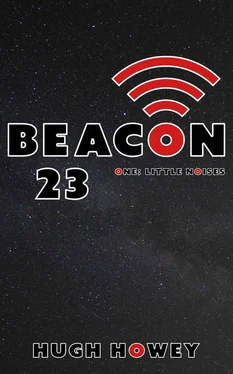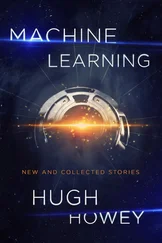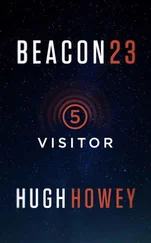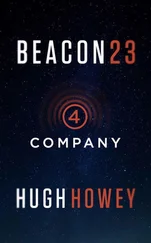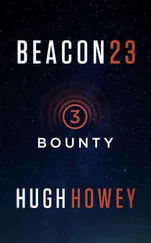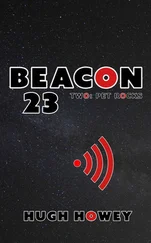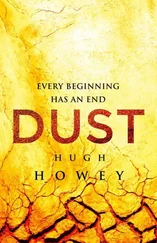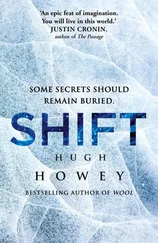I repeat this with the other relay. There’s a deep thump from the cut power, and the room goes full blackout. Emergency battery lights flicker on as their photosensors startle at the void. I count to ten again, letting the power drain from the system, all those little capacitors that can keep a memory of whatever’s ailing the processors. I want them to forget. When they power back up from a hard reset, they should restore themselves to factory conditions. Little newborn babes.
The relays are harder to turn back on, now that the T-bars are vertical. I brace a foot on a railing and give a good tug. There’s a twinge of pain in my belly from being a hero once. I remember a SIMCOM test years ago, making sure I could turn these relays ten times, back and forth, and thinking my guts were going to spill out of my knotted scars. I remember telling the graybeards after: “Nope, feels great. Never better.” Then pissing red for a week.
The lights come back with the first relay. I throw the second. There are no alarms. Everything is rebooting, circuits sorting themselves according to protein-based memories, software reloading from hardwired references. I’m mostly upset at my sleep having been disturbed, and I’m not looking forward to the paperwork and error logs I’ll need to wade through.
Up the ladder now, sweating, feet hurting, wishing I’d put on my boots, I check the time. 0326. Two minutes or so for a full reboot. Leaves two minutes of margin for the Orion cargo. Cutting it damn close. I’m thinking about the cargo bound for Vega, and the mess a wreck like that will make for the asteroid field. But it’s the Varsk that’s haunting me. There are five thousand souls watching in-flights right now with their earbuds in. Laughing at that comedy. Ordering another gin and tonic. Snoring. Fumbling for their seats in the darkness as they return from the head. A baby crying, someone sneezing and scaring the hell out of everyone else with that crowded, recycled air.
There’s a chime from the QT. A message from Houston. I go over to the screen to read it, but before I get there, the alarms go off again. Screaming at me. The red lights, throbbing. Full GWB failure a second time. After a hard reboot.
The impossibility of this is banging against my skull as I stare at the words on the QT, the message from NASA. I blink, but they don’t go away. I’d hoped for some solution, something like help up in this joint. Instead, all I get from them is:
What outage?
99% of my time working with NASA is spent bitching that I know more than they do. The other 1% of my time is spent trembling, pissing myself, realizing I might actually be right. Now is one of those latter times. Houston should know everything wrong with my beacon, especially the fact that it is no longer doing the beacon-like things beacons are built for.
Instead, I’ve got someone sipping tepid coffee down in the land of women and pizza checking his readouts and telling me there’s nothing amiss. When I goddamn know something is amiss . The GWB was cool to the touch. And the alarms are going off again.
I type another quick text. The QT works with entangled particles, and they’re destroyed as they’re used, but I don’t care about budgets right now so much as not wasting time with whatever dweeb can’t do his job. I also very purposefully employ the caps button, because they can, in this way, hear us scream in space:
GWB FULL FAIL. ZERO TRANSMIT. CARGO AND LUX LINER IN TRANSIT. HARD REBOOT NO GOOD.
Get on the job, Houston.
I try to imagine people down on Earth stiffening at their consoles, rubbing the sleep from their eyes, and fixing all of this for me remotely, but I know there’s not even enough time for another reboot, not before the transit. Not sure why, but I launch back down the barrel to the GWB. Maybe just to watch, to hope nothing happens, to see the complete lack of wake as a ship passes by at twenty times the speed of light.
The GWB is still lifeless and cold when I arrive, the alarms still flashing and blaring. I turn to the porthole facing the asteroid belt—and a new star blooms into a brief and ugly existence. A blinding flash of light. Streaks of molten metal like meteors. An expanding cloud of titanium tinsel. Asteroids crashing and tumbling and knocking into one another, cleaving into smaller hunks of rock. An immense amount of destruction, all without making a sound, a macabre ballet and light show.
A large chunk of the cargo vessel flips end over end, twisted like taffy, great black gouges down the side, and everywhere are the scraps of bright red and blue and gray containers, all their contents spilling into the vacuum of space, much of it pulverized beyond recognition.
It all happens in an instant. None of the destruction is there one moment—just quietude and the mingling of hippo-like rocks—and then chaos and burning and death and space litter. This is what it looks like when a billion-ton spacecraft goes from FTL to slamming into a rock the size of a small county. When the beacon’s GWB went out, it was like the street sign before a sharp curve had been removed, the one that warns of the approaching cliff. I think of the eight crewmembers dead. Eight is the number of men in a special battalions squad. We don’t normally lose them quite this fast. Oftentimes, one will crawl away and die a slow and lonely death on the edge of space. But no one is crawling away from the disaster beyond my porthole. And five thousand more lives are inbound at twenty times the speed of light.
The archives deep in the heart of beacon 23 house practically every novel ever written. A random trip through the database is an exercise in frustration, as for every one novel I would enjoy, there are roughly three billion I can’t get through, and no way of telling the two types apart other than a miserable chapter or two.
Which is why I spend more time reading through the complete Wiki, circa 2245, not updated in several decades, but close enough for solar nukes and frag grenades.
My curiosity over the picture of the lighthouse keeper and the tidal wave led me deep into the Wiki searching for answers, to no avail. But before I reached out to NASA with a research request, I stumbled upon an article that beggared belief. This article comes to mind as I watch the remnants of an interplanetary cargo vessel disperse itself across the cosmos. It comes to mind as I see what looks like two smaller pirate-class cargo vessels moving out there among the lifeless rocks and the tinsel of torn hull. The article was about an old profession long since lost. Or so the Wiki thought.
In the days of sea-bound ships, when hulls were made to keep water rather than vacuum out, and hazards to navigation were submerged rocks, not the floating-in-space kind, there was a dishonest profession of men known as wreckers.
I wouldn’t have believed it, were it not right there in the Wiki, but wreckers did just as described: they wrecked ships for a living. A brutal, murderous living.
I increased the zoom on the porthole and watched the flame of thrusters and the white puff of attitude controllers as the two black-painted cargo ships scooted from cargo container to cargo container. And the extreme coincidence of my GWB failure seemed to slide away. This was a lighthouse I was standing in, and lighthouses were not always appreciated.
Four or five centuries ago, a lighthouse would go up and down long before it went around and around. That is, some of the lighthouse would get built during the day, and then at night, many of those same stones would disappear. This would go on for months, until the builders posted guards and gave out beatings to the saboteurs. Lighthouses, you see, were bad business for the men who relied on wrecks for a living.
Читать дальше
